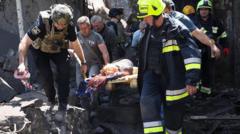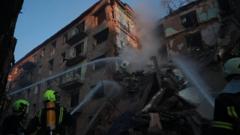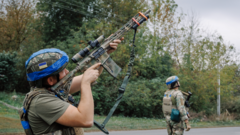Daniil Bardadim, a 17-year-old Ukrainian refugee, is accused of participating in a Kremlin-backed sabotage scheme following an enticing job offer. This incident reflects a larger trend in Russian covert operations targeting Europe amid escalating tensions.**
Teenager's Journey from Refugee to Accused Saboteur Amid Rising Russian Covert Operations**

Teenager's Journey from Refugee to Accused Saboteur Amid Rising Russian Covert Operations**
A Ukrainian teen finds himself in the eye of a storm as he faces terrorism charges for a suspected arson linked to Russian sabotage activities across Europe.**
In a striking tale of manipulation and unintended consequences, 17-year-old Daniil Bardadim, a Ukrainian refugee, transitioned from seeking safety to being implicated in a serious crime. After fleeing the tumult of war in Ukraine, Bardadim received a questionable job offer promising him a BMW and around $11,000 in cash. By the time he found himself in Warsaw, Poland, such a proposition seemed like a lifeline for the young refugee.
However, the reality turned dark when he accepted the offer, receiving an old BMW but not the promised money. Instead of financial security, Bardadim now faces serious terrorism charges for allegedly setting fire to an IKEA store in Vilnius, Lithuania. Investigators allege that the shadowy group responsible for the job offer had ulterior motives, ultimately turning him into an unwitting participant in a larger Russian sabotage agenda.
This incident is part of a disturbing trend of increasingly covert Russian operations aimed at disrupting stability across Europe. Reports indicate that the frequency of Russian attacks targeting shopping malls, warehouses, and even critical infrastructure like undersea cables and railways has surged significantly in the past two years. According to a study by the Center for Strategic and International Studies, covert attacks initiated by Russia's military intelligence service (GRU) have almost tripled between 2023 and 2024.
European governments express growing concern about these covert actions, viewing them as a component of a broader strategy linked to the ongoing conflict in Ukraine, raising fears that such shadowy aggression can easily escalate into more direct actions. As the situation unfolds, the plight of Bardadim serves as a chilling reminder of the vulnerable position of many refugees during such tumultuous times.





















